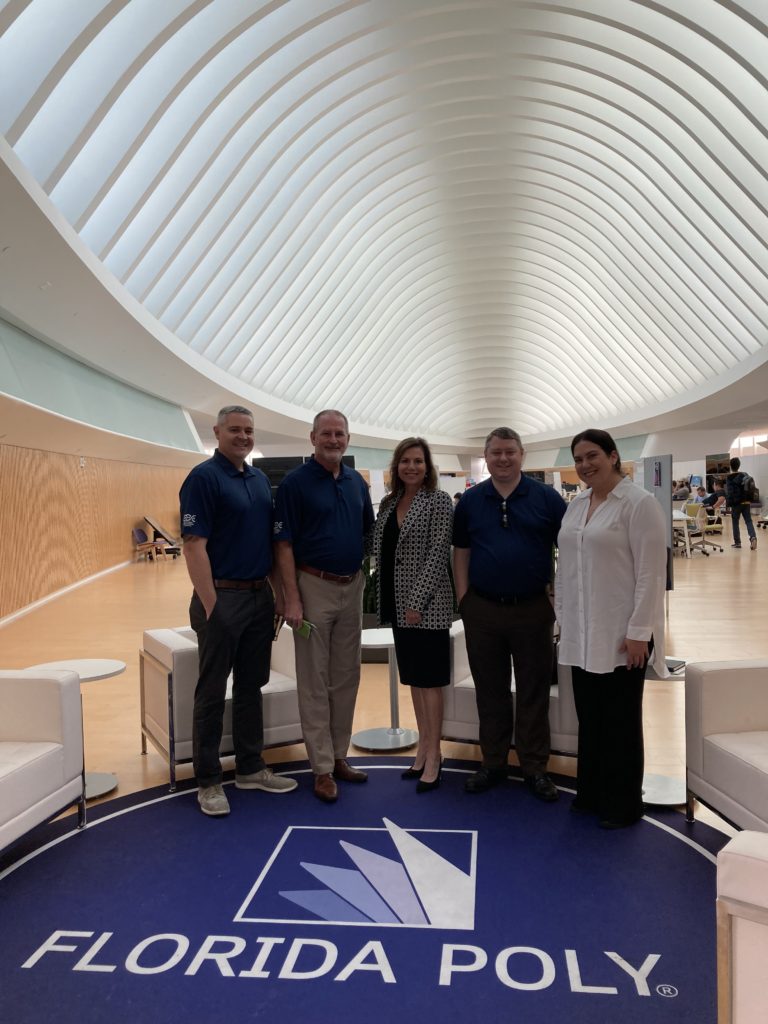Investor Spotlight: Florida Polytechnic University
January 30, 2023
Florida Poly is the nation’s leading institution of change, engineered from the ground up to push the boundaries of education in science, technology, engineering, and math (STEM). Florida Poly has about 1,500 undergraduate and graduate students and offers more than 31 programs of study. The University is the only state university in Florida dedicated exclusively to STEM education.
is the nation’s leading institution of change, engineered from the ground up to push the boundaries of education in science, technology, engineering, and math (STEM). Florida Poly has about 1,500 undergraduate and graduate students and offers more than 31 programs of study. The University is the only state university in Florida dedicated exclusively to STEM education.

Dr. Randy K. Avent, President
Dr. Randy K. Avent is the founding president of Florida Polytechnic University, the newest of the state’s 12 public universities and the only polytechnic university in the State University System of Florida.
As Florida Polytechnic University’s inaugural president, Avent is responsible for the development and operation of the university and is committed to strategically developing Florida Poly as a research and jobs university, an agent for growth and a beacon for the economy.
His career exemplifies the qualities of innovation, leadership and entrepreneurship the university seeks to instill in students. An accomplished academician, senior administrator and research scientist, Avent has an extensive background teaching and directing research at higher-education institutions dedicated to science, technology, engineering and mathematics (STEM).
The demand for tech talent in Tampa Bay is significant, and Florida Polytechnic is graduating the skilled tech talent local companies need. How can we best retain this talent in the Tampa Bay region?
It’s well known that there is great demand in Florida for high-tech talent. The Florida Chamber estimates that 55,000 STEM jobs go unfilled each month in our state, a gap caused by an underdeveloped pipeline of high-skilled professionals. However, the demand for these professionals in not exclusive to Florida, so our state needs to create a job market ecosystem that is broad on high-tech, high-salary positions and competitive with other states. The way we do this is by attracting more tech industry to the state, a mission for which Florida Poly is already playing an active role. Technical research universities like Florida Poly are a magnet for companies that want access to the in-demand, high-wage graduates the schools produce. At Florida Poly, we are producing that critical talent needed to grow the tech industry in our state. And this year, we welcomed Fortune 500 company IFF to our campus, as they began the construction of their Global Citrus Innovation Center. They became the first industry partner to set shop on our campus, which marks the beginning of the research park we envision anchored by the University.
What is the number one thing that you believe will impact our region’s competitiveness over the next decade?
The top thing that will impact Central Florida’s competitiveness in the next 10 years will be the expansion of important high-tech industry in the area, turning the region into the next Silicon Valley. These forward-thinking employers will bring next-generation jobs, creating greater economic opportunity and positively impacting the region’s economy. Florida Poly has a significant part in this by educating students in the key areas industry needs to be successful. Our curriculum is designed to adapt to these changing trends and produce high-skilled graduates who have the knowledge and experience to fill industry’s current and future high-demand, high-wage jobs.

What in your view are Florida Poly’s greatest opportunities for growth in the short term, and the longer term?
It’s an exciting time at Florida Poly. Our location, faculty, and educational focus on engineering and applied sciences mean that Florida Poly is in the enviable position to strategically plan our growth. We are focusing on many areas of growth, including growth in academics and programming, campus and facilities, faculty, students, student services, and industry partnerships. For example, we added two new master’s degree programs this academic year and are working toward adding more programs designed to meet the needs of high-tech industry.
Our campus also has great deal of room for growth. This year, we opened our new Applied Research Center to provide essential support and facilities for research and teaching. IFF also broke ground on our campus for its Global Citrus Innovation Center, which will provide many opportunities for our students and faculty while allowing the company access to our outstanding academic resources. Soon to come are the additions of a new dorm building and an engineering building, and we are working toward the development of a new Student Achievement Center. Both in the short term and long term, we will bring carefully considered structures to life to support our educational mission. Growth will also be seen on the expanses of land that surround our campus in the long term.
Our partnership with IFF highlights our short- and long-term priority of attracting more industry partners for collaboration, support, research, and employment. The new IFF building also represents the first step in the creation of a bustling research park that one day will be built in and around our campus. The area will be transformed into attractive locations for industry-leading employers who want to partner with Florida Poly or be near the top academic talent in the region. This live-work-play environment will support the growth of employees that will flock to the area, drawn by emerging businesses and the University itself.
Florida Poly opened a new Applied Research Center earlier this year. What’s your vision for this new center and the impact it will have on the university and greater region?
We were very excited to open our Applied Research Center this year as our second academic building. It’s a great facility that doubles our research capacity and strengthens our academic mission. The 90,000-square-foot building houses different types of labs and the latest equipment to enable our students and faculty to develop even more outstanding research.
The ARC also plays a key role in our research park vision. The facility was designed to serve as a research hub and magnet for industry looking for high-tech talent to provide solutions to their real-world problems. We are already seeing this research park vision starting to become a reality with IFF as our first industry partner on campus. They are building their advanced innovation facility just a few feet away from the ARC.
